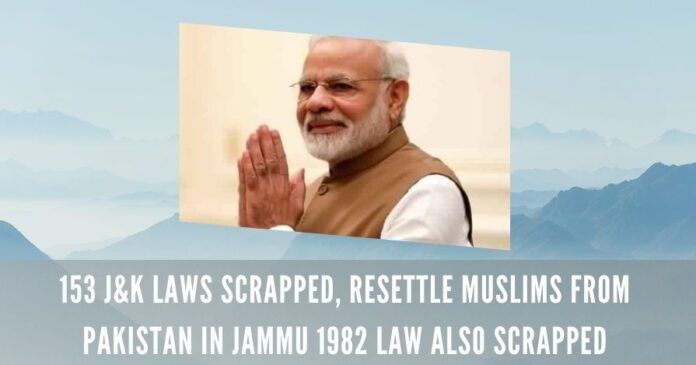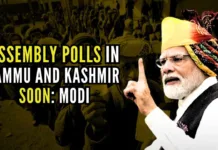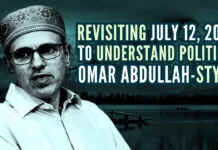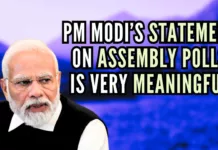
The Narendra Modi government deserves kudos for scrapping the J&K Resettlement Act and other 152 J&K laws, which had held Jammu, Kashmir and Ladakh aloof from the national mainstream.
Narendra Modi Government has taken one more step to integrate Union Territory of Jammu & Kashmir (J&K) fully into India. It has invoked the J&K Reorganisation Act, 2019, and abolished what was termed by many “a black law” passed by the communal Sheikh Abdullah Government way back in 1982. The law had allowed the return and resettlement of Muslims of J&K (read Jammu) who had migrated to Pakistan in the wake of communal partition of India. The law was known as “The Jammu and Kashmir Grant of Permit for Resettlement in (or Permanent Return to) the State Act, 1982”. It had enabled Muslims of Jammu province and their descendants, who migrated to Pakistan between March 1, 1947, and May 14, 1954, to return to India and resettle in Jammu. It is one of the 153 J&K laws and Governors’ Acts, which was done away with under the J&K Reorganisation Act. The J&K Reorganisation Act was passed by Indian parliament on August 5, 2019, and was enforced on October 31. On August 5, the Narendra Modi Government had also removed discriminatory Article 35A and rendered divisive Article 370 unreal for all practical purposes. Article 35A and Article 370 had created the Republic of J&K within the Indian Republic. Courtesy: JL Nehru.
The manner in which the Sheikh Abdullah Government acted left no other option for the Governor but to give his ascent as the Bill had been adopted by the State Legislature second time.
It would not be out of place to point out that it was Abdul Rahim Rather, who, in March 1980, had moved a private member Bill in the J&K assembly seeking resettlement of Muslims who migrated to Pakistan from Jammu. Many legislators from Jammu, including those belonging to Congress, opposed the Bill. As a result, the Bill was sent to a 9-member Select Committee of the J&K Assembly. The Select Committee recommended the adoption of the communally-motivated Bill and the Sheikh Government got it adopted by the J&K Legislature. The adopted bill was then sent to the then Governor of J&K, BK Nehru, for his assent. However, the Governor returned the Bill on September 18, 1982, suggesting “reconsideration” much to the chagrin of Sheikh Abdullah. Instead of appreciating the Governor’s suggestion, the Sheikh Abdullah Government used its strength in the State Legislature and again got it passed without any change whatsoever. The Sheikh Government not only ignored the Governor’s advice, but it also refused to consider the opposition to his controversial move from the Central Government. Interestingly, Indra Gandhi was the Prime Minister – Indra who had brought the deflated Sheikh back to power after a gap of 23 years under the 1974 Indra-Sheikh Accord. The Central Government had opposed the Resettlement Act. Its view was that the Act was “fraught with serious security implications and would go against the Citizenship Act”.
The manner in which the Sheikh Abdullah Government acted left no other option for the Governor but to give his ascent as the Bill had been adopted by the State Legislature second time. Unhappy as the Central Government was, it invoked provisions of Article 142 (1). As a result, the J&K Resettlement Act was sent under a presidential reference to the Supreme Court. The then President of India, Giani Zail Singh, sought the opinion of the apex court “as to whether the Bill or any of the provision thereof if enacted, would be constitutionally invalid”.
It needs to be underlined that under the J&K Resettlement Act “any person who, before May 14, 1954, was a J&K state subject of class I or class II, and who had migrated after March 1, 1947, to the territory now included in Pakistan, may himself or by his relative who is a permanent resident of the state, make an application before the competent authority with an expression of a desire to return to J&K”.
The Act further said: “The authority, if satisfied that the person desirous of resettlement in or permanent return to the state has a bona fide intention for such resettlement or permanent return to the state and was a state subject of class I or class II before May 14, 1954, and had migrated after March 1, 1947, or is a descendant, wife or widow of such state subject as the case may be, shall recommend such person to the government for grant of a permit for resettlement in or permanent return to the state”. Besides, the Act required the prospective returnees to fill a form of “Oath of Allegiance” both to the Constitution of India and J&K Constitution of 1957.
The BJP national president, Atal Bihari Vajpayee, also challenged the Act in the same court and in the same year. He became an intervener.
It is too well known that the Act had further widened the already rather wide gulf between Jammu province and Kashmir region. The Congress, the BJP and the J&K National Panthers Party (JKNPP) all vehemently opposed the Resettlement Act. Contrarily, all the Kashmir-based legislators supported to the hilt the return of the J&K Muslims from Pakistan and their settlement in Jammu as almost 99.99% were from Jammu.
The Kashmir-based National Conference all through defended the Resettlement law saying Section 6 of the J&K Constitution and the second proviso to Article 7 of the Indian Constitution provided for such a law. The upshots of the National Conference all along had been: (1) “Both the Constitutions – Constitution of India and Constitution of J&K — had empowered the J&K Assembly to make a law for the return of these migrants” and (2) “there is also a provision in the Constitution of India which says that upon their return, these migrants will get rights of Indian citizens and, under the J&K Constitution, they will get rights of J&K citizens”.
If, on the one hand, the Government of India approached the Supreme Court to ascertain its opinion on the Resettlement Act, on the other, the JKNPP also challenged it in the apex court in 1982 itself. Not just this. The BJP national president, Atal Bihari Vajpayee, also challenged the Act in the same court and in the same year. He became an intervener. Their move clicked partially as the apex court stayed the operation of the Resettlement Act. The apex court took 19 long years to hear the case but didn’t decide this way or that way. In the meantime, JKNPP leader, Harshdev Singh, again filed a writ petition against the Act.
On August 16, 2016, the apex court not just indicated that it could send the whole case to its constitutional bench, but also suggested that the “people of J&K, who migrated to Pakistan, could be considered for their return but not their descendants”. The Supreme Court again heard the case in December 2018 and on January 7, 2019. Earlier in 2001, the Supreme Court had returned the reference to the President with just three words: “Returned, respectfully, unanswered”.
The Narendra Modi government deserves kudos for scrapping the J&K Resettlement Act and other 152 J&K laws, which had held Jammu, Kashmir and Ladakh aloof from the national mainstream.
Note:
1. The views expressed here are those of the author and do not necessarily represent or reflect the views of PGurus.
- ‘Kashmir My core constituency’: Revisiting July 12, 2003 to understand politics, Omar Abdullah-style - March 15, 2024
- Total deviation from traditional approach: Seven takeaways from PM Modi’s March 7 Srinagar visit - March 9, 2024
- Status of political parties: Why is further J&K reorganization imperative? - March 1, 2024











Congress vote bank is getting reduced everyday